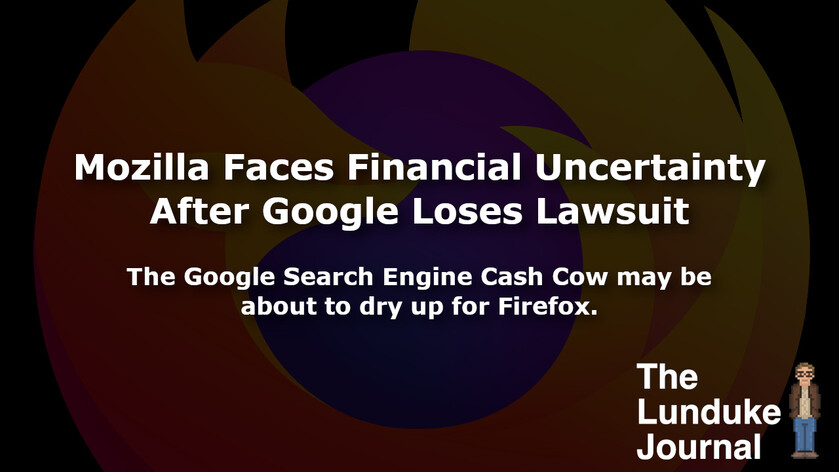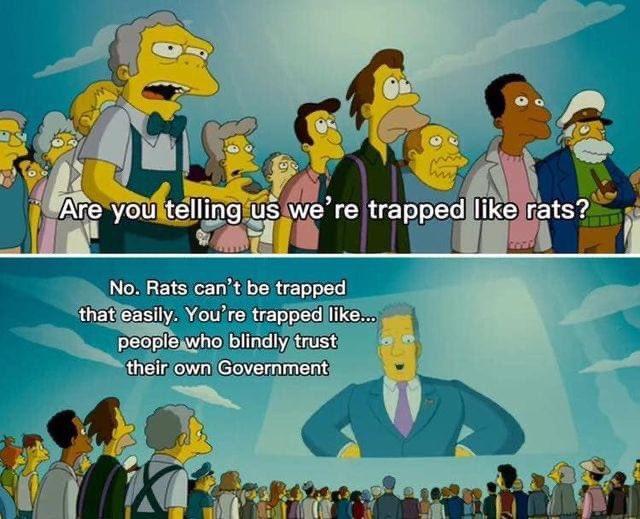It's no secret that Mozilla has been -- for several years -- almost entirely reliant on funding from Google in order to bankroll the continued development of Firefox. In fact, over 80% of Mozilla's revenue comes directly from a deal where Google is made the default search engine within Firefox.
Now, a legal ruling against Google -- declaring the company to be an illegal monopoly in the Search Engine market -- could cause all of that funding to dry up.
Possibly putting Mozilla out of business in the process.
The Google Antitrust Lawsuit
On October 20th, 2020, The U.S.A.'s Department of Justice (along with 11 States) filed suit against Google -- specifically alleging that Google held a monopoly on the Search Engine market, and had engaged in anticompetitive practices.
On August 5th, 2024, US District Judge Amit Mehta ruled against Google.
"After having carefully considered and weighed the witness testimony and evidence, the court reaches the following conclusion: Google is a monopolist, and it has acted as one to maintain its monopoly. It has violated Section 2 of the Sherman Act.
Specifically, the court holds that (1) there are relevant product markets for general search services and general search text ads; (2) Google has monopoly power in those markets; (3) Google’s distribution agreements are exclusive and have anticompetitive effects; and (4) Google has not offered valid procompetitive justifications for those agreements. Importantly, the court also finds that Google has exercised its monopoly power by charging supracompetitive prices for general search text ads. That conduct has allowed Google to earn monopoly profits."
What, exactly, does all of this mean?
It means -- in part -- that Google may be forced to significantly change how it operates its search business -- including paying companies like Mozilla and Apple for default or prominent Search Engine placement.
How this impacts Mozilla & Firefox
Some of the details documented in the lawsuit -- including in the deposition with Mozilla's ex-CEO, Mitchell Baker -- are fascinating.
From the August 5th ruling:
"Google also has a revenue sharing agreement with the browser developer Mozilla, whereby it pays Mozilla % revenue share in exchange for the default search placement on the Firefox browser.
The search access points on Firefox include “the search box” in the browser, “the navigation or location bar,” any “search box displayed on a Firefox Startpage,” among others.
If Mozilla implements the “this time, search with” feature on its mobile application, the revenue share paid under the Google-Mozilla agreement drops from %[REDACTED] to %[REDACTED]."
In short: Google pays a set revenue-sharing percentage to Mozilla to be the default search engine within Firefox. What is that percentage? That specific detail is redacted in all of the documentation.
But we do know that the easier Firefox makes it to use a non-Google search engine (such as with a "this time, search with [a non-Google Search Engine]..." feature)... the less money Google pays Mozilla.
And, from ex-CEO Baker's deposition the following details were provided:
"Google’s 2021 revenue share payment to Mozilla was over $400 million, or about 80% of Mozilla’s operating budget. Mozilla has repeatedly made clear that without these payments, it would not be able to function as it does today."
Which simply confirms what we all have been able to assume for a number of years: Mozilla is dependent on Google to fund current operations.
Should Google be prohibited from continuing this existing deal, it could require a dramatic change to Mozilla: either by forcing Mozilla to find other funding sources... or engage in massive layoffs.
What Happens Now?
But will Google be prohibited from continuing such a "Default Search Engine" deal with Mozilla and others (like Apple)?
That remains to be seen. At this point Google is likely to appeal the ruling -- which will likely delay any remedy phase of this case. And, should Google's appeal ultimately fail, the remedy / penalty phase of this case could go in a large number of different directions.
Just the same, a prohibiting of "Default Search Engine" deals (at least as they currently exist), seems like an obvious remedy that is likely to be implemented. And, should that happen, Mozilla's finances will change in a major way (having 80%+ of your revenue going away will have a massive impact on any business).
None of this, however, will be a surprise to Mozilla... the corporation clearly has seen this coming.
The Firefox Mega-corporation has been making significant changes to their business over the last few years -- downplaying their flagship product (Firefox) while focusing on A.I. investments, purchasing an advertising company, and massive internal power struggles which seem focused on rebuilding Mozilla as an advertising company.
Just the same, considering the lack of realized revenue from their A.I. or Advertising initiatives, it's hard to see how Mozilla will weather this storm without siginificant layoffs.
But the timing -- and details -- of what happens next remains to be seen.
While I have your attention, there were also a few interesting (and amusing) side-notes and tidbits within this legal ruling.
The Government Sees Mozilla as "Marginal"
Within the August 5th ruling there were a number of statements, regarding the Firefox marketshare, which I couldn't help but find somewhat amusing.
"Firefox’s contribution to the overall search market is so small that the additional output it produces, at most, marginal procompetitive benefits."
... and...
"its share of the browser market is so low that it does not move the competitive needle"
Firefoxes "share of the browser market is so low" that it doesn't "move the needle."
Ouch.
Firefox Experiments on Users
The ruling included several references -- often from the Mozilla ex-CEO's deposition -- to experiments run on Firefox users. Specifically switching the default search engine for small subsets of users.
"Mozilla has run experiments to assess a potential switch of the default [Search Engine] from Google to a rival. It tends to run these experiments when its agreements come up for renewal."
... and...
"From 2021 to 2022, Mozilla once again switched the default [Search Engine] to Bing for 0.5% of desktop Firefox users."
This sort of experiment was, apparently, repeated regularly.
Have you ever noticed your Firefox default search engine change? Out of nowhere... your search engine was now... Bing? You may have been part of one of Mozilla's many experiments on their users.
Considering the rocky terrain that Mozilla is facing -- in part as a consequence of this Google ruling -- my guess is we'll see Mozilla Firefox conducting many additional "experiments" in the months ahead.


















